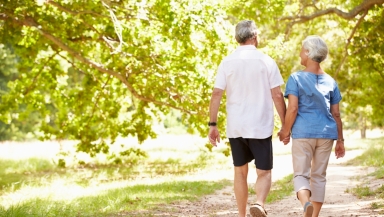
"Don't grow old," a parishioner of advanced years warned me some while back. "You won't like it."
Sadly, that woman is no longer with us, and I'm a whole lot older than when she offered me that kind advice. But was there wisdom in her words?
It's true that generally people are living longer and in better health than in generations before, but there are increasing challenges for older men and women in our communities.
So I ask the question: is your town or city a good place to grow old?
I'm not talking about the quality of the care homes or the health services, but about the everyday lives of older people.
My friend, Maggie Dodd is the 'Anna Chaplain' for older people in my part of Hertfordshire, north of London. She is one of a network of around 300 such chaplains up and down the UK. Anna Chaplains are named after the widow, Anna, who appears with Simeon in Luke's gospel.
They spiritually support people – of strong, little or no faith – in care homes, sheltered housing or in their own homes. Maggie's important work is backed by the city's two Methodist churches.
Maggie has told me how life is becoming harder for older people in the area, and we've swapped notes on what we have both observed. Many of the things she talks about would apply across the UK, and probably overseas too.
She explained: "Some of the basic services older people need are becoming more difficult to access. I hear about doctor's surgeries asking for patients to print out their own forms or send photos to or from smartphones.
"Banks are phasing out high street branches, pushing everyone towards online banking - many older people feel very uneasy about going online, worried of being scammed out of their savings.
"A trip to the shops is also becoming more complicated. Checkouts in supermarkets are increasingly self-service. Mobility can also be affected as car parks often need an app to be uploaded onto a smartphone to park. Many city car parks ask for payment by app – at my local station, there is no option to pay by card or cash!"
It's not just older men and women who are disadvantaged by the move away from people and cash to technology and smartphones. People with poor eyesight or reduced cognitive abilities can also struggle.
Plans to remove the ticket offices at UK train stations will make matters worse for many would-be rail travellers. Increasing numbers of restaurants are encouraging people to order and pay for their meals on smartphones. BBC local radio – listened to by many older people – is facing cutbacks.
Maggie told me, "This gradual marginalisation of people can leave them feeling lonely and isolated. Loneliness can have a huge detrimental effect on health and wellbeing. Prolonged social isolation and loneliness are the equivalent of smoking 15 cigarettes a day."
I agree with Maggie, and I'm grateful to her for raising this issue. Older people are being increasingly marginalised when, alongside people of all ages, they should be able to play a full part in our community.
The Church of England, along with many churches, wants to encourage more younger people to be part of church communities. The CofE has placed 'growing younger and more diverse' as one of its three key priorities for the 2020s. It's an objective I support and welcome.
Yet it's important too that all churches are aware of the needs and challenges for the older women and men in our churches, and in the wider community. Groups like the 'Anna Chaplains' have a key role to play in highlighting these concerns.
Many churches run special events and activities for older people, as well as groups for all ages. It's part of our calling to be salt and light in our local communities.
But, in addition, Christians are called to follow Christ's example and speak out for those on the margins of our society. In today's UK, US or elsewhere, that could be anyone reaching later life...
Rev Peter Crumpler is a Church of England minister in St Albans, Herts, north of London, and a former communications director with the CofE.













